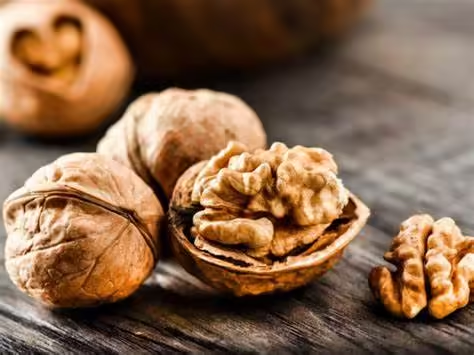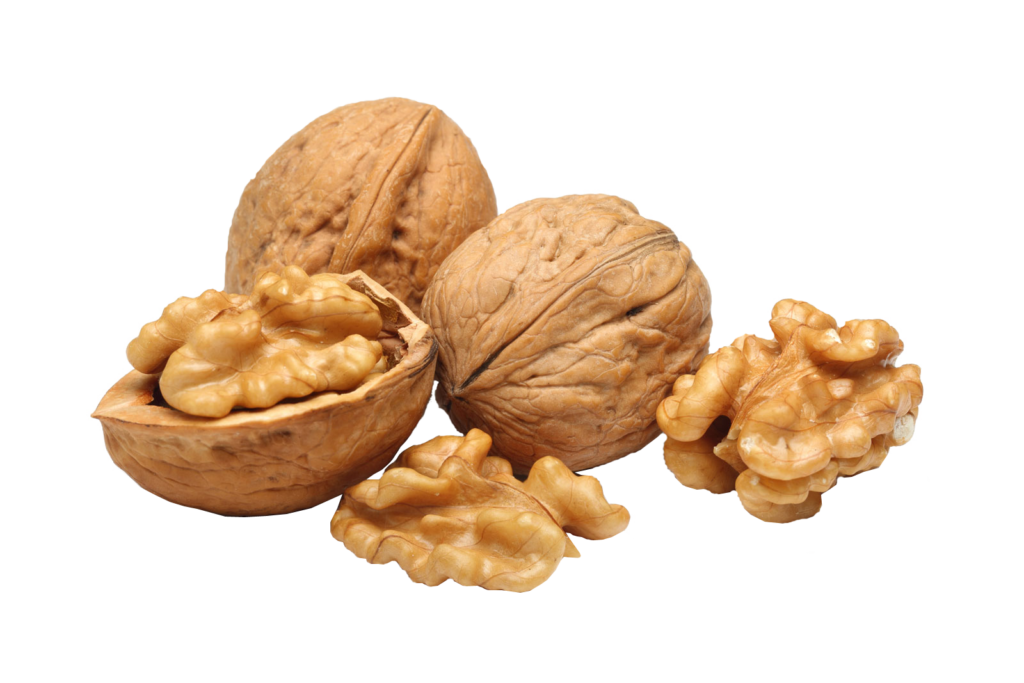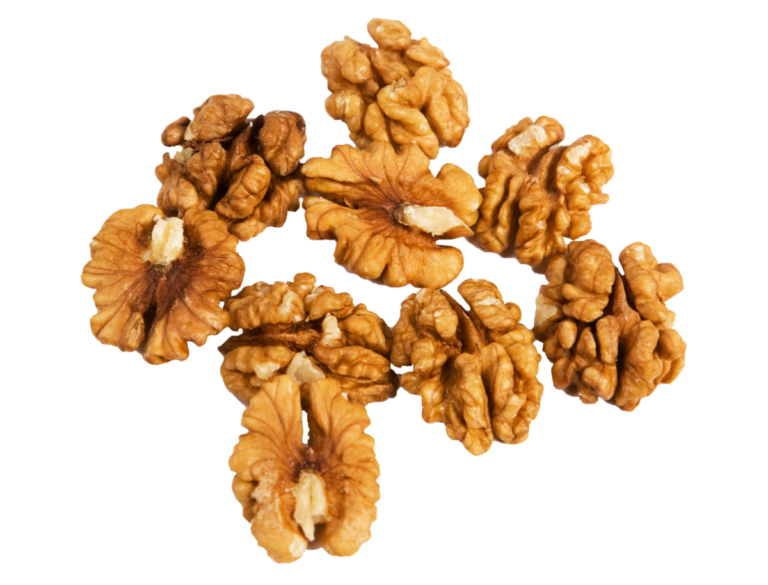"Walnuts: The Nutrient-Rich Powerhouse for Health, Beauty, and Culinary Delights"

Introduction
Walnuts, often referred to as “brain food,” have been a staple in diets across the world for centuries. Revered for their unique flavor, rich nutritional profile, and numerous health benefits, these nuts play a significant role in both culinary creations and holistic well-being. Whether consumed as a snack, used in baking, or incorporated into salads and main dishes, walnuts have earned their place as a superfood. Beyond their nutritional value, walnuts also carry a legacy of medicinal use and cultural significance that dates back to ancient civilizations. In this comprehensive blog post, we’ll explore the myriad benefits of walnuts, their history, culinary applications, and how they can be incorporated into a modern, health-conscious lifestyle.
The Nutritional Power of Walnuts
Walnuts are packed with essential nutrients that provide a host of health benefits. They are an excellent source of plant-based omega-3 fatty acids, proteins, vitamins, and minerals. Let’s break down the nutritional components that make walnuts a powerhouse:
Healthy Fats: Walnuts are rich in polyunsaturated fats, particularly alpha-linolenic acid (ALA), an omega-3 fatty acid. ALA plays a vital role in reducing inflammation, promoting heart health, and supporting brain function.
Protein: A handful of walnuts provides around 4.3 grams of protein, making them a great plant-based protein source for vegetarians and vegans.
Fiber: Walnuts contain both soluble and insoluble fiber, which aid in digestion, promote gut health, and help regulate blood sugar levels.
Antioxidants: Walnuts are high in polyphenols, compounds known for their powerful antioxidant properties. These antioxidants help combat oxidative stress and may reduce the risk of chronic diseases.
Vitamins and Minerals: Walnuts are loaded with essential vitamins and minerals like vitamin E, folate, copper, magnesium, and manganese, which contribute to bone health, brain function, and overall vitality.

The Health Benefits of Walnuts
- Heart Health
Numerous studies have highlighted walnuts’ potential to improve cardiovascular health. The high concentration of omega-3 fatty acids and antioxidants helps reduce cholesterol levels, lower blood pressure, and decrease the risk of heart disease. Regular consumption of walnuts has been linked to improved blood vessel function and a reduced likelihood of developing heart-related conditions.
- Brain Health
Walnuts are often associated with improved brain function, largely due to their high content of DHA, a type of omega-3 fatty acid. DHA has been shown to support cognitive development in infants and reduce cognitive decline in adults. Additionally, walnuts contain antioxidants and vitamin E, which protect the brain from oxidative damage and improve memory and cognitive skills.
- Weight Management
Contrary to the belief that nuts can contribute to weight gain, studies show that consuming walnuts in moderation can actually aid in weight management. The high protein, fiber, and healthy fat content promote a feeling of fullness, reducing overall calorie intake. Walnuts also stimulate fat-burning processes in the body, making them a beneficial snack for those trying to maintain or lose weight.
- Anti-Inflammatory Properties
The polyphenols and omega-3 fats in walnuts have strong anti-inflammatory properties. Regular consumption of walnuts has been shown to reduce inflammation markers in the body, which is beneficial for individuals with chronic inflammatory conditions such as arthritis, asthma, and autoimmune diseases.
- Cancer Prevention
The antioxidants and bioactive compounds found in walnuts may play a role in cancer prevention. Studies suggest that walnut consumption can inhibit the growth of cancer cells, particularly in the case of breast and prostate cancers. The high content of ellagic acid, a type of polyphenol, has been found to have anti-carcinogenic effects.
- Improved Gut Health
Walnuts have a prebiotic effect on the gut, promoting the growth of beneficial bacteria. A healthy gut microbiome is essential for overall wellness, as it plays a crucial role in digestion, immunity, and even mood regulation. Consuming walnuts regularly can enhance gut flora diversity, which is linked to better metabolic health.
- Better Sleep
Walnuts are a natural source of melatonin, a hormone that regulates sleep-wake cycles. Including walnuts in your evening meal or snack can support better sleep quality, especially for individuals who struggle with insomnia or irregular sleep patterns.
Healthy Fats: Walnuts are rich in polyunsaturated fats, particularly alpha-linolenic acid (ALA), an omega-3 fatty acid. ALA plays a vital role in reducing inflammation, promoting heart health, and supporting brain function.
Protein: A handful of walnuts provides around 4.3 grams of protein, making them a great plant-based protein source for vegetarians and vegans.
Fiber: Walnuts contain both soluble and insoluble fiber, which aid in digestion, promote gut health, and help regulate blood sugar levels.
Antioxidants: Walnuts are high in polyphenols, compounds known for their powerful antioxidant properties. These antioxidants help combat oxidative stress and may reduce the risk of chronic diseases.
Vitamins and Minerals: Walnuts are loaded with essential vitamins and minerals like vitamin E, folate, copper, magnesium, and manganese, which contribute to bone health, brain function, and overall vitality.
- Heart Health
Numerous studies have highlighted walnuts’ potential to improve cardiovascular health. The high concentration of omega-3 fatty acids and antioxidants helps reduce cholesterol levels, lower blood pressure, and decrease the risk of heart disease. Regular consumption of walnuts has been linked to improved blood vessel function and a reduced likelihood of developing heart-related conditions.
- Brain Health
Walnuts are often associated with improved brain function, largely due to their high content of DHA, a type of omega-3 fatty acid. DHA has been shown to support cognitive development in infants and reduce cognitive decline in adults. Additionally, walnuts contain antioxidants and vitamin E, which protect the brain from oxidative damage and improve memory and cognitive skills.
- Weight Management
Contrary to the belief that nuts can contribute to weight gain, studies show that consuming walnuts in moderation can actually aid in weight management. The high protein, fiber, and healthy fat content promote a feeling of fullness, reducing overall calorie intake. Walnuts also stimulate fat-burning processes in the body, making them a beneficial snack for those trying to maintain or lose weight.
- Anti-Inflammatory Properties
The polyphenols and omega-3 fats in walnuts have strong anti-inflammatory properties. Regular consumption of walnuts has been shown to reduce inflammation markers in the body, which is beneficial for individuals with chronic inflammatory conditions such as arthritis, asthma, and autoimmune diseases.
- Cancer Prevention
The antioxidants and bioactive compounds found in walnuts may play a role in cancer prevention. Studies suggest that walnut consumption can inhibit the growth of cancer cells, particularly in the case of breast and prostate cancers. The high content of ellagic acid, a type of polyphenol, has been found to have anti-carcinogenic effects.
- Improved Gut Health
Walnuts have a prebiotic effect on the gut, promoting the growth of beneficial bacteria. A healthy gut microbiome is essential for overall wellness, as it plays a crucial role in digestion, immunity, and even mood regulation. Consuming walnuts regularly can enhance gut flora diversity, which is linked to better metabolic health.
- Better Sleep
Walnuts are a natural source of melatonin, a hormone that regulates sleep-wake cycles. Including walnuts in your evening meal or snack can support better sleep quality, especially for individuals who struggle with insomnia or irregular sleep patterns.
Healthy Fats: Walnuts are rich in polyunsaturated fats, particularly alpha-linolenic acid (ALA), an omega-3 fatty acid. ALA plays a vital role in reducing inflammation, promoting heart health, and supporting brain function.
Protein: A handful of walnuts provides around 4.3 grams of protein, making them a great plant-based protein source for vegetarians and vegans.
Fiber: Walnuts contain both soluble and insoluble fiber, which aid in digestion, promote gut health, and help regulate blood sugar levels.
Antioxidants: Walnuts are high in polyphenols, compounds known for their powerful antioxidant properties. These antioxidants help combat oxidative stress and may reduce the risk of chronic diseases.
Vitamins and Minerals: Walnuts are loaded with essential vitamins and minerals like vitamin E, folate, copper, magnesium, and manganese, which contribute to bone health, brain function, and overall vitality.
The Beauty Benefits of Walnuts
Walnuts aren’t just beneficial when consumed; they also have numerous beauty-enhancing properties when applied topically or incorporated into a skincare routine.
- Skin Health
The antioxidants and omega-3 fatty acids found in walnuts help protect the skin from environmental damage, reduce signs of aging, and keep the skin hydrated and plump. Vitamin E, in particular, works to repair skin cells and improve skin elasticity, giving the skin a youthful glow.
- Hair Health
Walnut oil is often used in hair treatments to nourish the scalp, reduce dandruff, and promote stronger hair. The high content of biotin (vitamin B7) in walnuts helps to strengthen hair follicles, reduce hair fall, and promote hair growth.
- Natural Exfoliants
Crushed walnut shells are often used as a natural exfoliant in skincare products. They gently slough away dead skin cells, leaving the skin smooth and radiant. However, it’s important to use these exfoliants carefully, as over-exfoliating can damage the skin.
The Culinary World of Walnuts
Walnuts’ rich, buttery flavor and crunchy texture make them a versatile ingredient in both sweet and savory dishes. Here are some popular culinary uses:
- Walnuts in Baking
Walnuts are a classic addition to baked goods like brownies, cookies, and bread. Their slightly bitter taste balances the sweetness of desserts, adding depth to flavors.
- Salads and Dressings
Sprinkling chopped walnuts on salads adds texture and a burst of flavor. Walnuts can also be blended into salad dressings for a creamy, nutty finish. A walnut vinaigrette, for example, pairs wonderfully with roasted vegetables and mixed greens.
- Savory Dishes
In savory cooking, walnuts are often used in pesto sauces, as toppings for pasta, or as a crunchy addition to stir-fries. Walnut-stuffed meats and walnut-crusted fish dishes are also popular in Mediterranean and Middle Eastern cuisines.
- Nut Butter
Walnut butter is a healthy alternative to traditional peanut butter. It’s creamy, rich, and packed with nutrients, making it a great spread for toast or a dip for fruits.
Walnuts’ rich, buttery flavor and crunchy texture make them a versatile ingredient in both sweet and savory dishes. Here are some popular culinary uses:
- Walnuts in Baking
Walnuts are a classic addition to baked goods like brownies, cookies, and bread. Their slightly bitter taste balances the sweetness of desserts, adding depth to flavors.
- Salads and Dressings
Sprinkling chopped walnuts on salads adds texture and a burst of flavor. Walnuts can also be blended into salad dressings for a creamy, nutty finish. A walnut vinaigrette, for example, pairs wonderfully with roasted vegetables and mixed greens.
- Savory Dishes
In savory cooking, walnuts are often used in pesto sauces, as toppings for pasta, or as a crunchy addition to stir-fries. Walnut-stuffed meats and walnut-crusted fish dishes are also popular in Mediterranean and Middle Eastern cuisines.
- Nut Butter
Walnut butter is a healthy alternative to traditional peanut butter. It’s creamy, rich, and packed with nutrients, making it a great spread for toast or a dip for fruits.
- Walnut Milk
Walnut milk is a dairy-free, plant-based milk that can be made by blending soaked walnuts with water. It has a smooth texture and a mildly sweet taste, making it a great alternative for vegans or those who are lactose intolerant
Walnuts in Traditional Medicine
Walnuts have been used in traditional medicine systems for centuries, valued for their health-promoting properties.
Ayurvedic Uses
In Ayurveda, walnuts are known as “Akhrot” and are considered a “sattvic” food, meaning they promote balance and purity of mind and body. They are believed to increase body warmth, improve digestive health, and boost cognitive functions. Walnuts are often prescribed to strengthen the nervous system and enhance brain function due to their high omega-3 content.
Traditional Chinese Medicine
In Traditional Chinese Medicine (TCM), walnuts are seen as a food that strengthens the kidneys and lungs. They are often used to treat conditions related to these organs, such as lower back pain, asthma, and constipation. Chinese practitioners also recommend walnuts for improving vitality and energy.

How to Incorporate Walnuts into Your Diet
Incorporating walnuts into your diet is easy and can be done in various ways:
Daily Recommendations
A daily intake of about 1-2 ounces (or a handful) of walnuts is generally recommended to reap their health benefits without overconsumption of calories. This translates to approximately 14 walnut halves per day.
Recipe Ideas
- Breakfast: Add chopped walnuts to oatmeal, yogurt, or smoothies.
- Snacks: Enjoy roasted walnuts with a pinch of sea salt or mix them into trail mixes.
- Salads: Sprinkle walnuts over salads for added crunch and nutrition.
- Desserts: Use walnuts in brownies, cakes, or homemade granola bars.
- Savory Dishes: Incorporate walnuts into pesto sauces, stuffings, or grain bowls.
Tips for Storing Walnuts
Walnuts are high in fat, making them susceptible to rancidity if not stored properly. Store walnuts in an airtight container in a cool, dark place. For longer shelf life, refrigerate or freeze walnuts, especially if they have been shelled.
Environmental Impact of Walnut Cultivation
Walnut farming, like any agricultural activity, impacts the environment. However, walnuts are generally considered a sustainable crop when grown responsibly.
Sustainability of Walnut Farming
Walnuts are a long-term crop, with trees taking several years to mature and produce nuts. However, once established, walnut trees can yield nuts for many decades. They also provide other benefits, such as absorbing carbon dioxide and producing oxygen.
Water Consumption and Soil Health
One downside to walnut farming is its relatively high water requirement, especially in regions prone to drought. However, advances in irrigation technology, such as drip irrigation, have helped reduce the water footprint of walnut cultivation. Additionally, walnut orchards can contribute to improved soil health through practices like crop rotation and organic mulching.
Global Walnut Production: Major Producers and Exporters
The United States is the world’s largest producer of walnuts, with California accounting for over 90% of the country’s walnut production. Other major producers include China, Iran, and Turkey. The global demand for walnuts continues to grow, driven by increasing awareness of their health benefits.

Growing Walnuts: A Guide to Cultivation
If you’re interested in growing your own walnut tree, here’s what you need to know:
Climate and Soil Requirements
Walnuts thrive in temperate climates with mild winters and warm summers. They require well-drained, fertile soil with a pH level between 6 and 7. While walnut trees are fairly resilient, they prefer areas with adequate rainfall or irrigation to support their growth.
Common Pests and Diseases
Walnut trees are susceptible to a variety of pests and diseases, including codling moths, walnut blight, and root rot. Integrated pest management strategies, such as crop rotation and the use of organic pesticides, can help mitigate these risks.
Harvesting and Processing
Walnuts are typically harvested in the fall, when the nuts begin to drop from the trees. After harvesting, the nuts are hulled, dried, and stored for later use. Proper drying is crucial to prevent mold growth and ensure the nuts’ quality.
Fun Facts About Walnuts
- Walnuts have been eaten by humans for over 10,000 years.
- The ancient Greeks and Romans believed walnuts had medicinal powers and used them to cure various ailments.
- In Roman times, walnuts were known as Juglans regia, meaning “Jupiter’s royal acorn.”
- Walnut wood is highly prized for furniture-making and is known for its durability and beautiful grain.
- Walnuts have been used in traditional ink production, with walnut shells and husks yielding a rich, brown pigment.

Conclusion
Walnuts are much more than just a tasty snack. They are packed with essential nutrients, beneficial fats, and powerful antioxidants that promote heart health, support brain function, and contribute to overall wellness. Whether consumed raw, incorporated into meals, or used in traditional medicines, walnuts offer numerous health benefits that make them a valuable addition to any diet.
By understanding the nutritional profile, health benefits, and culinary versatility of walnuts, you can take full advantage of this ancient and powerful nut. So, the next time you reach for a snack, consider walnuts—not just for their taste, but for the wealth of benefits they provide to your body and mind.